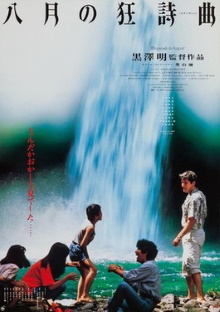This is Akira Kurosawa’s second last film and generally the last few films he made were not very well received. This one is conventional in terms of story and style but was nevertheless criticized at the time for serving an anti-American agenda, something which Kurosawa has never been known to do. Personally I thought this might have been a little too heavy-handed in its messaging but it’s far better than I expected and does exactly Kurosawa set out to do: restore the power of the atomic bombings to shock and terrify modern audiences.
A now elderly survivor of the Nagasaki atomic bombing, Kane, is contacted by a Japanese-American man in Hawaii who claims to be her brother and asks her to come visit him. She refuses as she doesn’t remember him but sends her adult children on her behalf who are delighted as the man is very rich. Meanwhile she is happy to have her four grandchildren over for the summer. She recounts stories from her youth to them and they visit a local school where Kane’s husband, their grandfather, was a teacher and where he died when the bomb hit. Part of the school grounds is now a memorial for the victims and the visit leads the children to respect their grandmother more and question America’s role for dropping the bombs. Kane is finally convinced that the man in Hawaii is her brother when he names some of the other siblings but only agrees to visit after commemorating the anniversary of the bombing. The children then discover that their parents kept this fact of their grandfather’s death a secret from their American relatives for fear of offending them and become resentful.
Content-wise this does seem rather different from the more famous films that Kurosawa made early in his career and there are moments when it belabors its point too much. When the children go to the school and talk about the bombing it essentially turns into a documentary for a while. Yet the grandmaster of cinema retains his deft touch all the same in the little moments that bring out the humanity of his characters. The children of course love Kane dearly but aren’t afraid to complain about her cooking that is more suited to an elderly person’s palate. As Kane is led to reminiscence about her siblings, she recounts stories about them which invariably tend to be scary such as a brother who eloped with the wife of another man and had to build his own cabin in the woods. These little stories engender sympathy for the characters but also sets up the kind of chilling mood necessary when Kane gets around to talking about her memory of what happened on the day of the bombing. As the children point out, it’s one thing to learn about it as just another event in history but it’s something else entirely for those were actually there that day. This film is all about reclaiming the power of what happened to shock and to accord the tragedy a sense of sanctity. In that, this film succeeds admirably.
The accusation that this film has an anti-American slant is understandable given that the children take note of how other countries have contributed works of art as memorials to the bombing but not the United States itself as the country that actually dropped the bombs. Yet Kurosawa later softens this stance by showing Clark, Kane’s American nephew, being properly sorrowful and respectful towards the dead. As such I think Kurosawa’s anger is more directed against Japanese who seem willing to understate the tragedy in order to appease Americans. At the same time, it is probably fair to say that the film seems to invite outsiders to share in Japan’s pain but fails to extend similar courtesy to the pain of others. The children for example note that even China has sent a memorial to Japan but never stop to think about China’s own civilians suffering during the war. Similarly they are delighted to have Clarke’s sympathy but never bother asking him if any of his own relatives on the American side died during the war. This is a pattern that recurs often enough in Japanese media that it is annoying.
Moral qualms aside this is still undoubtedly a masterful film with considerable expressive power and it is striking how Kurosawa injects emotion in so many ways, large and small. Describing the atomic bomb as a giant, baleful eye in the sky isn’t something that I’ve seen anywhere else but once you’ve seen it, the image is unforgettable. This kind of powerful imagery is present throughout the entire film and that is reason enough to make this a very strong recommendation.
